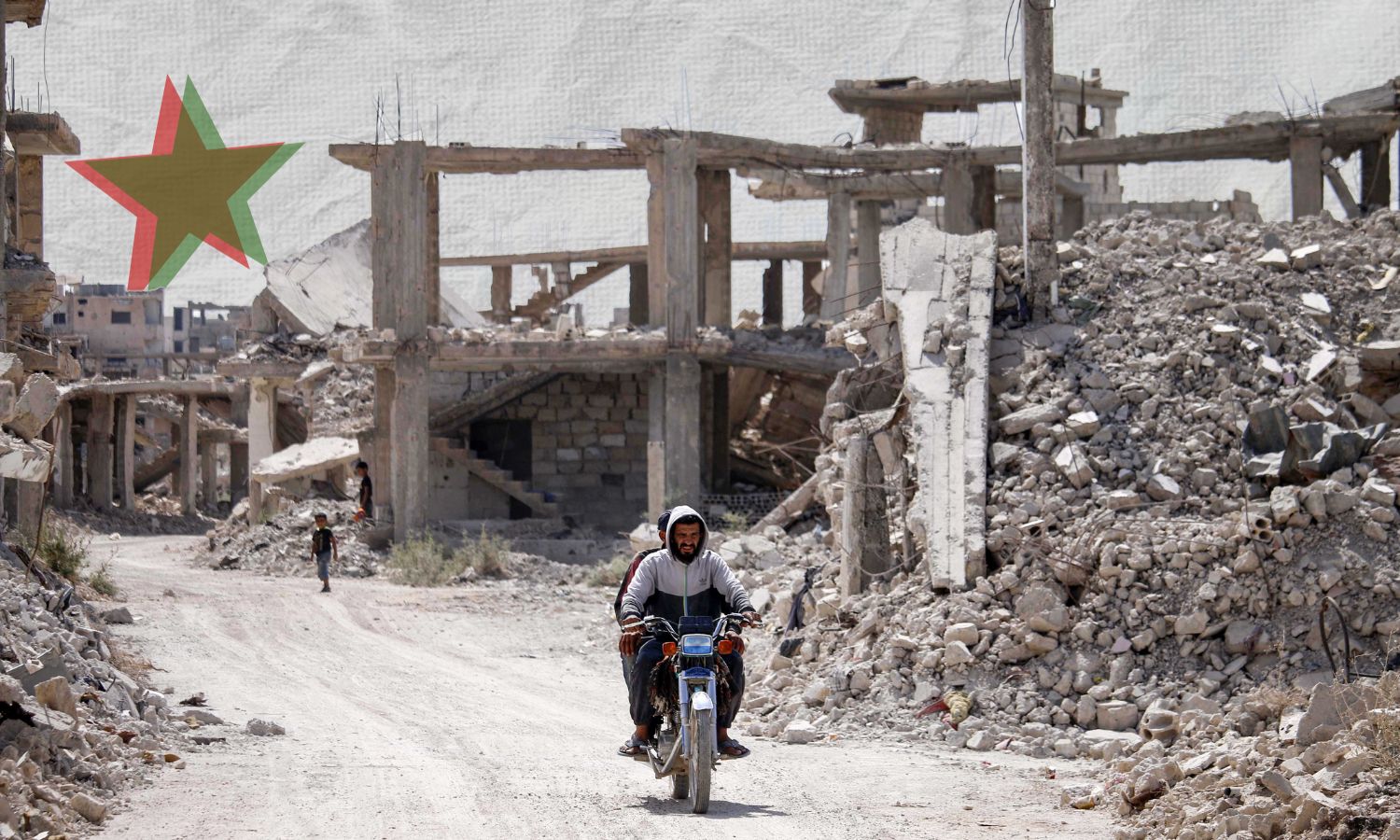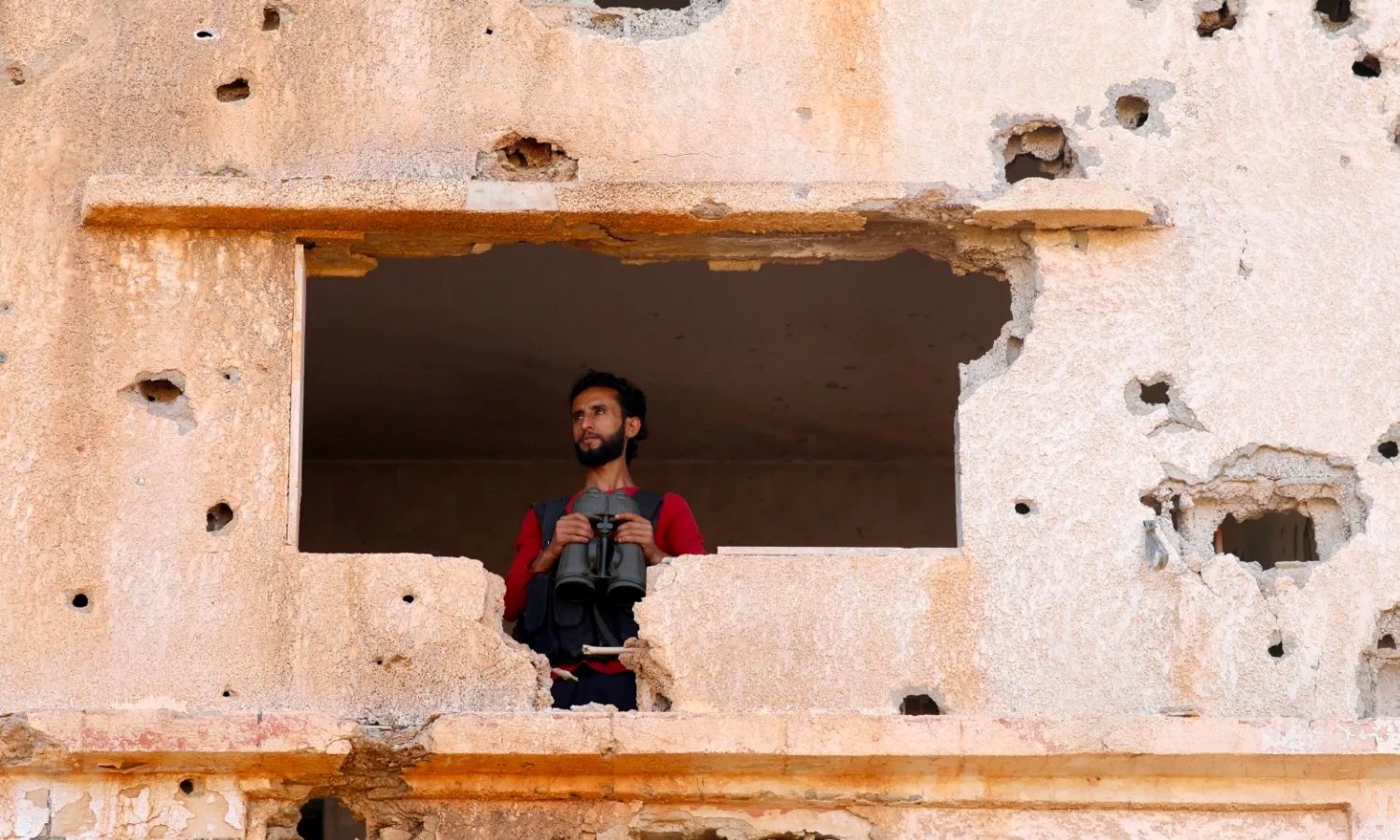



Khaled al-Jeratli | Halim Muhammad
Local groups formed from the remnants of the opposition factions in Daraa governorate launch security campaigns targeting other groups on charges of affiliation with the Islamic State (IS) group or Hayat Tahrir al-Sham (HTS) (which controls a part of northwestern Syria). Meanwhile, the attacking factions face accusations of allegiance to the regime or coordination with it.
The latest of these attacks took place in the town of al-Yadoudah, west of the province, on January 8, when an alliance of local factions was formed, consisting of the Eighth Brigade and the Central Committee factions against groups accused of being responsible for assassination operations in the province.
The Central Committees, formed in August 2018 following the Syrian regime’s control of the area, are considered the largest military force among the non-regime combat groups in Daraa. It included the leadership of former factions, chiefs, and notables at the beginning of its establishment and was working on negotiations with Russia and the Syrian regime to implement the terms of the “settlement” agreement.
As for the Eighth Brigade, it is a local faction formed by Russia from the remnants of the opposition “al-Sunnah Youth” faction, which was one of the largest opposition factions in southern Syria before the settlement agreement. It is the only faction that possesses medium weapons after heavy weapons and armor were withdrawn from all Daraa factions under the settlement agreement. The Eighth Brigade belongs administratively to the regime’s Military Security after Russia withdrew its support for the faction.
The latest confrontations in the town of al-Yadoudah resulted in the death of the former opposition faction’s leader, Mohammed Jadallah al-Zoubi, along with six other individuals from both sides and injuries among the civilians from the region’s residents.

A fighter in the Free Syrian Army in the town of al-Yadoudah in Daraa’s countryside – May 2018 (Reuters/Alaa Faqir)
Two leaders of the local factions attributed the participation in the security operation in the town of al-Yadoudah to the spread of targeting of members of the Central Committee in Daraa province, the latest of whom was the local leader, Radi al-Hashish.
The two leaders, who spoke to Enab Baladi, referred to some local groups as safe havens for elements from the Islamic State and Hayat Tahrir al-Sham.
Moreover, the two leaders – who are active in Daraa’s western countryside and withheld their names for security reasons – revealed that the operation was a response to assassination operations that targeted many members of the Central Committee and religious leaders, particularly in the western countryside.
According to the leaders, the Eighth Brigade participated in supporting the Central Committee factions with ground defenses and medium weapons only but did not engage completely with its full military weight.
On December 18, the prominent leader Radi al-Hashish was targeted west of Daraa, resulting in his death. He was a former leader in the Jaysh al-Mu’atazz Billah (previously one of the largest factions in Daraa) and one of the founders of the Central Committees and supervisors of the negotiations with the Syrian regime and Russia in Daraa’s western countryside.
Abu al-Fida al-Sukkari, one of the notables of Daraa’s eastern countryside, told Enab Baladi that the security operations, the latest in al-Yadoudah, have obliterated the customs and traditions of Hauran and ignored the tribal systems followed by the region.
He condemned the method of attack in burning and destroying houses and targeting civilians, according to his expression.
Enab Baladi could not independently verify the death of any civilians during the operation itself.
Moreover, al-Sukkari added that as long as an accusation was directed at a party for assassinating the leader Radi al-Hashish, there were “tribal and legal customs” that could have been followed instead of forming military convoys from the Eighth Brigade affiliated with the Syrian regime and the Central Committee factions and attacking al-Yadoudah.
Enab Baladi obtained testimonies from three participants in the operation that the confrontations in al-Yadoudah resulted in the death of Mohammed Jadallah al-Zoubi and the charring of his body after his house, where he had barricaded himself for hours, caught fire.
Regarding the split that occurred in southern Syria after the “settlement,” Mahmoud al-Bardan (Abu Murshed), a former leader in the Army of the Revolution and a member of the Central Committee in Daraa’s western countryside, explained that the region fell under an international resolution that led to the nominal control of the regime over southern Syria.
Iran is always behind the regime’s control of the region through negotiations that delivered al-Hudaydah in Yemen to Saudi Arabia in exchange for Daraa and Quneitra to the Syrian regime, according to al-Bardan, who had a good relationship with the MOC operations room coordinating international support for the Syrian opposition before 2015.
He added that after the regime’s control, al-Nusra Front left with its cadres to northern Syria. Similarly, the regime and opposition factions took over the basin of Yarmouk, which used to be a stronghold of the Islamic State, prompting some leaders to hide in some farms without showing up during the year following the “settlement.”
After stabilization in southern Syria, which was initiated by the Central Committees that managed the service sector and prevented the regime forces from infiltrating the south, leaders from Hayat Tahrir al-Sham returned to Daraa, followed by the activation of Islamic State groups in the area.
Al-Bardan accused components of Tahrir al-Sham and cells of the Islamic State of being responsible for the assassinations and targeting that affected notables and former leaders from the governorate.
He said some former leaders in the Free Syrian Army provided a suitable environment for the return of cells from the IS organization and Hayat Tahrir al-Sham, which resulted in the death of dozens of the best notables and leaders of Hauran.
Regarding the latest security operation in al-Yadoudah, Al-Bardan said, “We had enough. Dialogue with these components is no longer effective. Our only choice is to fight them. We had already informed the notables of al-Yadoudah that Hauran is determined to eradicate this imminent danger.”
He added that this operation is the result of a meeting held in the city of Tafas in November 2023, which concluded with an agreement to fight cells of the Islamic State, drug dealers, and thieves, according to Al-Bardan.
After the July 2018 “settlement” and the defeat of the opposition factions, the Central Committees were formed with three main components: Daraa al-Balad Committee, the Western Countryside Committee,” and the Eighth Brigade led by Ahmed al-Awda, who was affiliated with the Fifth Corps formed by Russia in 2016 and then followed the Military Security.
Some small military groups that refused the “settlement” deal in Daraa and opposed the negotiations between the Central Committees and the Syrian regime remained.
At the beginning of the Committees’ formation, most of the military leaders in Daraa joined, as the negotiations were initially limited to the Russian side. However, due to the Russians failing to fulfill their promises to pressure the Syrian regime to release detainees, withdraw the security checkpoints, return the dismissed employees, and resolve the issue of defectors, the role of the Central Committees decreased, and some leaders, such as Khaldoun al-Zoubi, Mohammed Jadallah al-Zoubi, and Adham al-Akrad (all killed in separate incidents), defected from it.
In 2019, assassination operations began targeting members of the Central Committees, killing the leader Yasser al-Dhneefat, Sheikh Abu al-Baraa al-Jalm, Musab al-Bardan, Sheikh Ahmad Baqirat, Sheikh Mahmoud al-Banat, and others who had social standing in their communities.
Enab Baladi tried to reach out to former leaders of the opposition factions who oppose the Central Committees movements in Daraa but did not receive a response at the time of publishing this report.
Assassinations subsequently formed two conflicting military streams in Daraa, where Central Committees and the Eighth Brigade, which defected from the committees and independent groups, accused the defectors and groups on the other side of providing protection to members of the Islamic State organization. In contrast, those groups accused the Central Committees of compliance and subordination to the Syrian regime apparatus, specifically the Military Security.
The former opposition factions’ leader, First Lieutenant Naji al-Majarish (residing in Jordan), told Enab Baladi that the military situation in southern Syria is witnessing ongoing security tension due to the conflict between two main parties under close scrutiny by the regime.
The security tension’s presence was reinforced when figures previously associated with the Free Syrian Army found themselves in close alliance with extremist organizations such as Hayat Tahrir al-Sham and the Islamic State, but they were always scattered and did not adhere to a central decision, unlike the opposite faction that the Central Committees controlled through coordination among them, according to al-Majarish.
The second party, according to al-Majarish, are former leaders and members of the Free Syrian Army whose interests aligned with the regime’s, and they went so far as to coordinate closely like the Eighth Brigade, agreeing on subordination to the Military Security while still clinging to their affiliation with the Free Army and operating on the principle of “emergency support for former comrades.”
All these conflicts have left behind a security-tense area with frequent killings, theft, and drug smuggling.
A leader in the Eighth Brigade, who kept his name confidential for security reasons, refused to call the operation a “military campaign,” considering it a limited security operation targeting a group led by Mohamed Jadallah al-Zoubi. He denied any regime forces’ participation in the operation or any use of heavy weapons during the attack.
The Russian agency Sputnik reported through its correspondent in Daraa that “one of the most prominent leaders of the Islamic State group in southern Syria was killed by Syrian Army fire.”
It added that the operation was supported by local armed groups, including the Eighth Brigade, which had conducted “reconciliations with the Syrian state” over the past years under Russian auspices.
A commander in the Eighth Brigade denied the regime’s involvement or its connection with the attack, adding that the brigade’s military convoy passed through regime checkpoints, as it was composed of a large military force; thus, the security barriers would not intercept it.
He also mentioned that many members of the Eighth Brigade who participated in the security campaign were originally wanted by the regime on security and political charges.
The dissident colonel from the regime’s forces, Munir al-Hariri (a native of Daraa and resident in Jordan), believes that the province is experiencing “utter chaos,” planned and coordinated by the regime with all its security joints and with endorsement from Iran, to fail the “communal harmony” in the south and to show the regime as the only party capable of controlling the region.
He told Enab Baladi that the regime has succeeded in shifting the scene from factional conflicts to retaliation situations led by individuals with no standing in society, “with a clear absence of reason and wisdom and those of opinion from both sides.”
Al-Hariri sees that the regime and “Islamic organizations” have supported some parties and contributed to the growth of their power at the expense of the other party, and considering the current scene, some parties have become indirectly executors of the regime’s pre-set agenda for the region.
if you think the article contain wrong information or you have additional details Send Correction